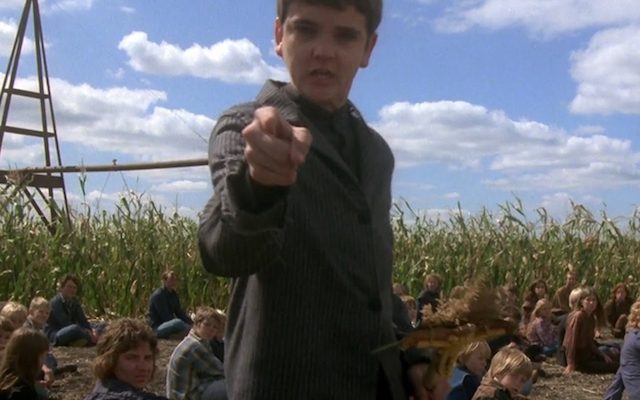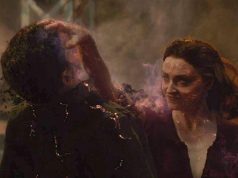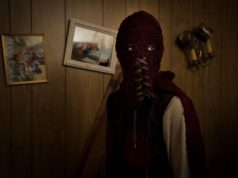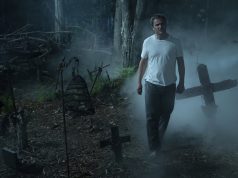
Since the dawn of cinema, filmmakers have strived to convey the important truth about kids, which is that they’re evil and should not be trusted. Yes, “children are our future,” as the great prophetess Whitney taught us many years ago. But her unspoken subtext was that our future is one in which we will be enslaved by these demonic children, cruelly subjected to their malicious whims, unless we destroy them all now.
“Children of the Corn” is one of the many films to address this important issue. Like a lot of horror movies, it is based on a Stephen King story and isn’t very good. Also like a lot of horror movies, it led to innumerable sequels — I mean it, scientists literally don’t know how many there are — and helped people to be afraid of the Midwest, as nature intended.
The setting is a small fictional town called Gatlin in a large fictional state called Nebraska. Gatlin used to be a quaint little place, the sort of town where everybody knew everybody else, where folks would smile and say hello when they passed, and where adults were not brutally murdered by their children. Then, one peaceful Sunday afternoon, all the adults were brutally murdered by their children. To be fair, what else is there for young people to do in Nebraska on a Sunday? Also, many of the victims were old and probably cranky.
You might wonder why the kids suddenly up and murdered everybody. That is a normal question to have. The movie says that it was because a creepy boy named Isaac (John Franklin) told them to, for God. Well! That explains it! You know how kids are: always eager to join a religious movement that demands devotion and sacrifice, always looking for an uncharismatic member of their peer group to slavishly follow. No further explanation is necessary — no, really, movie, don’t bother providing any more details, that’s fine.
Now it’s three years later. The sudden violent death of every adult in Gatlin somehow escaped the attention of the surrounding communities, and the kids are doing fine on their own. Indeed, the people have Nebraska have basically forgotten that Gatlin ever existed. It may sound implausible that such a significant event could go unnoticed, but keep in mind, this was before Twitter.
The brand of religion preached by Isaac is a strict one. In addition to the commandment about murdering everyone over the age of 18, there are rules against music, games, art, and other entertainment. (Again, you can see why young people were so readily drawn to it.) But Isaac isn’t just pulling these doctrines out of thin air, or his butt, or wherever the kids are pulling falsehoods out of nowadays. He gets his orders from He Who Walks Behind the Rows, an otherwise unnamed deity who evidently lives in the massive cornfields that comprise 128% of the Midwest. Isaac is merely HWWBTR’s prophet, declaring the good tidings of HWWBTRism to His followers.
As great as this all sounds, there are, believe it or not, some children in Gatlin who have lost faith in HWWBTRism. But the only way to escape the town is to go through the cornfield, and if you do, Isaac’s lieutenant, Malachai (Courtney Gains), will stab you to death. Malachai is a memorable character because he’s — there is not a delicate way to put this — ugly enough to knock a buzzard off a crap-wagon. Ask anyone what they remember about this film and I bet they’ll mention Malachai. The actor who played him has grown up to be an ordinary-looking man, but he was a goony, ostrich-faced youth, and his ghoulish orange visage haunts my dreams.
Anyway, Malachai kills a boy who tries to escape from Gatlin, then stands his body up in the middle of the road. He does this 1) in defiance of physical laws stating that dead bodies do not stand up on their own, and 2) in a way that ensures it will attract the attention of any passing motorists, which is actually something Malachai and his fellow cultists do not want. Sure enough, the dead kid gets hit by the people who it turns out are the heroes of the movie: Vicky (played by a pre-“Terminator” Linda Hamilton) and her doctor husband Burt (played by a pre-whatever-else-he-was-in Peter Horton), who are driving to the West Coast and have elected to skip the freeways in favor of the backroads that America is famous for, with their colorful roadside attractions and produce stands and dead boys.
Vicky and Burt look for help at the nearest sign of civilization, a decrepit garage run by an old man (R.G. Armstrong) who has an agreement with Isaac’s followers: in exchange for deterring all passersby from driving into Gatlin, Isaac’s followers will not murder him. The old man dutifully discourages Vicky and Burt from going to Gatlin, but then Isaac’s kids kill him anyway, which goes back to what I said about children being untrustworthy.
The pair wind up in Gatlin anyway, and they eventually figure out the town’s horrifying secrets, only about a million hours after normal people would have figured it out. The few children they see are acting skittish; there are literally no adults anywhere; the streets are deserted and overgrown with weeds; every building has dried-up corn husks strewn inside of it (because apparently at some point Isaac said, “Behold! He Who Walks Behind the Rows commands you to put dried-up corn husks everywhere!”); and the wifi is unreliable. “There’s something very strange about this town,” Vicky says thoughtfully as they drive through empty streets after visiting a dilapidated, rat-infested diner and seeing three urchins try to steal their car. Vicky is sharp!
While Burt goes looking for a phone, Vicky stays with a little girl they’ve met named Sarah who seems nice enough. Burt and Vicky are unwise to split up like that, but the plot requires it so that Vicky can be captured by the evil kids, which will give Burt something to do for the rest of the movie. Burt turns out not to be very good at rescuing his wife from children. But lucky for him, there’s a power struggle between Malachai and Isaac during which Vicky is freed and Isaac is tied to a cross made out of cornstalks, from which he hollers indignantly like Daffy Duck, with a lot of “You can’t do this to me!” and “It’s all mine!” and whatnot.
Well, then a supernatural entity devours Isaac. We were not expecting that. We thought the whole “He Who Walks Behind the Rows” thing was hooey, but nope, it’s legit. Only problem is, the children thought they were worshipping God all this time, and it turns out it’s actually been a demon. Whoops! Isaac punk’d them. The kids are disappointed to learn they’ve been tricked into worshipping the devil, just as the members of the Westboro Baptist Church someday will be.
How can Burt and Vicky and the repentant children destroy the demon that lives in the cornfield? The kids wish they knew! Some of them have been searching for a solution for a while now! Whatever the standard method is for removing unwanted devils from cornfields, they are not aware of it. I mean, you could set the cornfield on fire, obviously, but there must be more to it than just– hmm? There isn’t more to it? You burn the corn down, and that’s it, the demon is gone? Huh. That is not the climax I would have conceived for this story, but I probably wouldn’t have tried to build a horror film around a food crop in the first place.
Discussion questions:
– Is corn the scariest vegetable? Why or why not?
– Would it be funny to make a joke to the effect that burning all that devil corn produced Satanic popcorn, and that from this hellfire sprang Orville Redenbacher? Support your answer with examples from the text.
– Have you ever been to Nebraska? Shut up, no you haven’t.
– Think about the times you’ve considered murdering your parents. Were your religious beliefs a factor? Or did you have other reasons? What stopped you? Explain.
— Film.com





